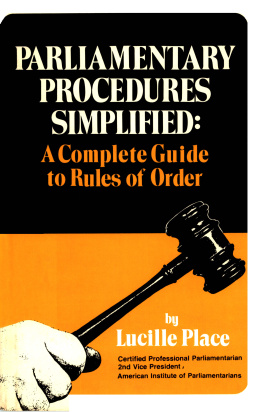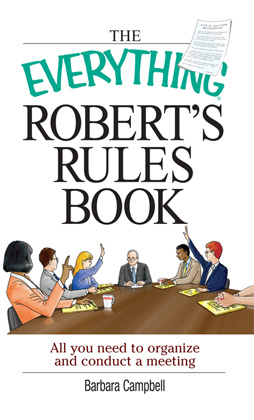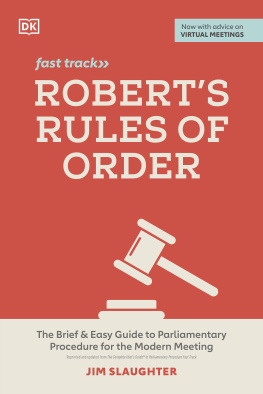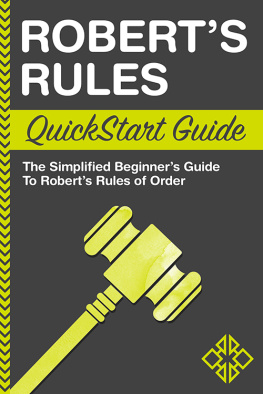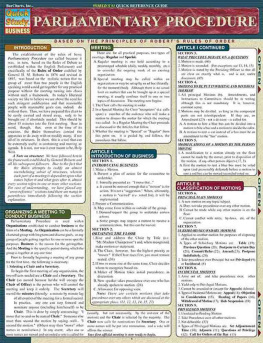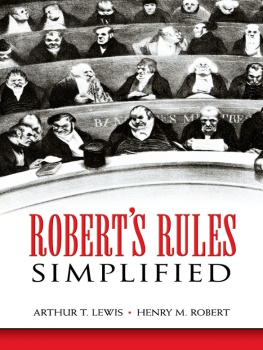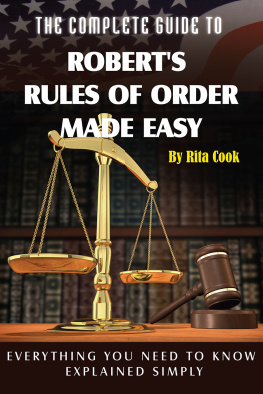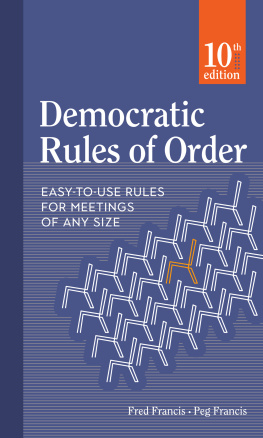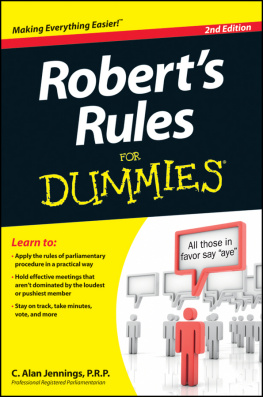

Library of Congress Cataloging in Publication Data
Place, Lucille.
Parliamentary procedures simplified.
1. Parliamentary practice.I. Title.
JF515.P693060.4276-16466
Library of Congress Catalog No. 76-16466
ISBN: 0-8119-0269-2
ISBN: 0-88391-049-7 (Paper)
Copyright 1976 by Lucille Place
All rights reserved. No part of this work covered by the copyright hereon may be reproduced or used in any form or by any meansgraphic, electronic, or mechanical, including photocopy, recording, taping, or information storage and retrieval systemswithout the permission of the publisher.
For information address:
Frederick Fell Publishers, Inc.
386 Park Avenue South
New York, New York 10016
Published simultaneously in Canada by
Fitzhenry & Whiteside,
Limited, Toronto
2 3 4 5 6 7 8 9 0
Manufactured in the United States of America
Dedicated to
The memory of my Dad and Grandpa
Henry Clay Cutliph, Sr.
Henry Clay Cutliph, Jr.
and to the future of my children, Jimmy, Charmian, and Terry
and especially to my grandson, Gib
.with Liberty and Justice for ALL
Hopefully, future generations can make these words a reality.
Lucille Place
ACKNOWLEDGMENTS
I want to express my thanks to Richard S. Kain, past president of the American Institute of Parliamentarians for designing the CHART used in this book; and to Robert D. Tucker, a mechanical engineer and one of my former students, who made the CHART available for practical use.
My thanks also to the faithful members of the American Institute of Parliamentarians who are responsible for the continued inspiration and encouragement that motivated me to write this book.
And especially to my very patient and understanding husband, Vernon.
ACCOLADES
PARLIAMENTARY PROCEDURE SIMPLIFIED is a new approach in learning this subject. The book is written in understandable language and uses the most commonly used motions. The Motions Chart illustrates procedure and a good, workable understanding is given in the question and answer section.
Lester L. Dahms
Executive Director
American Institute of Parliamentarians
I am pleased to see that Lucille Place, a leading American parliamentarian, has finally accepted the challenge of writing a new, simplified approach to parliamentary law. Her book is clear because her thinking is clear.
Dr. Darwin Patnode
Chairman of the Accrediting Committee
Past President
American Institute of Parliamentarians
PARLIAMENTARY PROCEDURE SIMPLIFIED by Lucille Place is a short cut to understanding the rules for democratic meeting procedure. Organization men and women would do well to consult this book first if they wish to become more effective in a short time in their participation in meetings.
Richard S. Kain, CPP
Past President
American Institute of Parliamentarians
INTRODUCTION
During 1976 we celebrated the 200th birthday of our country. This very special occasion heightened our sense of gratitude for living in a nation where we may enjoy freedom of speech and the absolute right to exercise that liberty. Yet, while we gave our thanks we were also aware that during these years we have simultaneously experienced oppression and chaos.
I have personally observed and experienced both of these extremes during my lifetimethe freedom and the chaos. The revelations born of these experiences, as well as my 26 years of almost continuous research in the field of parliamentary law, has convinced me without equivocation that if we are truly to fulfill the principles of freedom that Thomas Jefferson wrote about when he composed the Declaration of Independence, a fourth R must be added to our educational process: Readin, Ritin, Rithematic, and RULES.
Although most individuals claim to use the accepted parliamentary authority, Roberts Rules of Order, few appear to have learned the basic concept of the Rules. Unfortunately, too many people believe that everyone else took a course in parliamentary procedure at school and, therefore, are educated in the mechanics of meetings. This, of course, is a myth. The truth is that there are very few who have been schooled in the process and there are very few who are prepared to participate or preside at a meeting, including legislative sessions from the local to the national levels.
Our most erroneous assumptions are applied to the educational and legal professions. We assume that educators and lawyers emerge from universities and law schools well versed in parliamentary procedure without acknowledging the difference between the practice of law per se, and the practice of parliamentary law. There is an important and significant distinction that must be made between these two bodies of knowledge, yet I have found few law schools or any other schools throughout the country that offer even a short course on the subject. This lack in our educational process accounts for the chaos within our system, for WHEN RULES ARE MADE UP AS WE GO ALONG, THEY ARE INCONSISTENT AND INEVITABLY CAUSE CONFUSION.
The purpose of this book is to clear up that confusion; to instruct you in the rules for most effectively exercising your freedom of speech; to teach you how to have your voice and all voices heard; and to offer you a simplified course in parliamentary procedure.
Lucille Place
Part I
WHY PARLIAMENTARY PROCEDURE?
What is Parliamentary Law?
My young daughter recently asked me, Mother, why do we need parliamentary procedure? I explained to her that parliamentary procedure has the same effect at a meeting as the traffic laws have on the streets. If you and Daddy are to get to school and to work this morning, you will have to obey the traffic laws; you must stop at the stop signs and slow down in the congested areas. If you dont, you may still get there, but you may find it chaotic and nerve-wracking.
I further explained to her that while she and her Daddy were free to go to school and to work, others were also free to do the same. But, that freedom doesnt mean that all free people can go through the intersection at the same time!
Without rules at meetings, and those rules applying to everyone equally, the meetings often become something like a congested area of traffic; they turn into shouting matches, are run dictatorially with an unqualified person directing, or end up with few reaching their desired destination.
It is a fact of life that almost every human being will attend a meeting of some kind during his lifetime. If there is no communication at that meeting, there is no productivity, unless, of course, there is a political boss, a dictator, who tells the group what to do, when to do it, and how it must be done.
WHEN NO ONE, EXCEPT THE CHOSEN FEW, IS ALLOWED TO SPEAK, THERE IS OPPRESSION; WHEN EVERYONE FEELS THAT FREEDOM IS THE FREEDOM TO DO AS ONE PLEASES, THERE IS CHAOS.
Parliamentary law (parliamentary procedure), therefore, is the art of procedural rules that can enable a group of individuals in a free society, whether there are three or 3,000, to meet together and accomplish the purpose for which it has assembled.
No Skills Needed?
There may be so little knowledge of parliamentary procedure that one isnt even aware of his or her ignorance of the subjectI shall give an example. Recently, an educator who has a Ph.D. degree sent me a parliamentary procedure lesson plan to review for him. (Incidentally, I congratulate his group for finally realizing that parliamentary procedure is a must if our freedoms are to continue. They realize that todays youth is asking to participate, and that the only way participation can be successful is through the orderly process of using accepted rules of procedure. It is my belief that if these rules had been a part of our school curriculum; that is, if we had been taught how to participate, as well as how to listen, we would never have had the hot summers of the 60s.)
Next page
